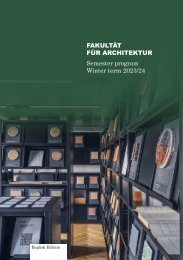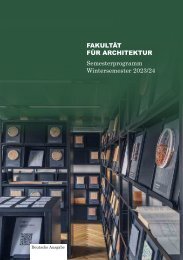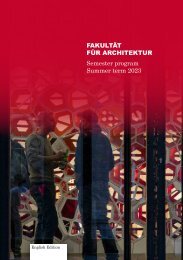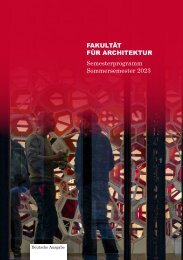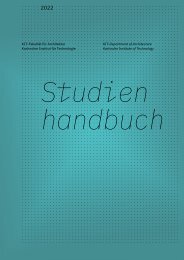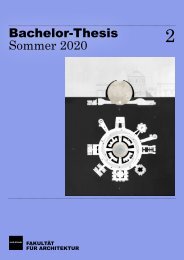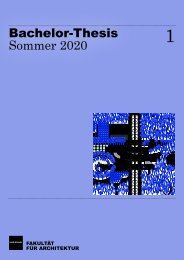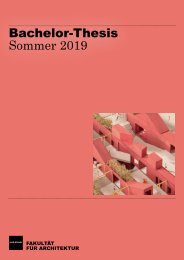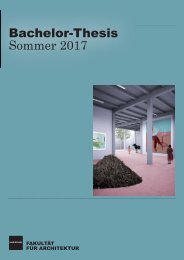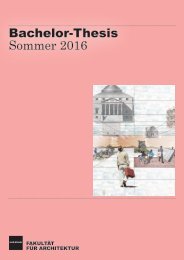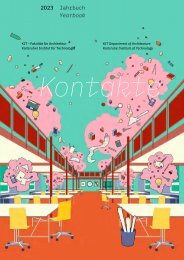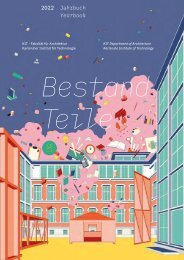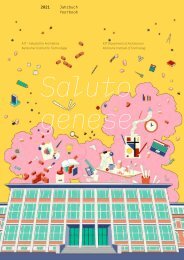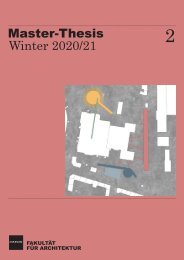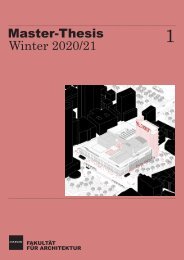KIT-Fakultät für Architektur – Master-Arbeiten Winter 2019/20 – Teil 1/2
Dokumentation von Masterabschlussarbeiten des Wintersemesters 2019/20 an der Fakultät für Architektur am Karlsruher Institut für Technologie. Teil 1 von 2.
Dokumentation von Masterabschlussarbeiten des Wintersemesters 2019/20 an der Fakultät für Architektur am Karlsruher Institut für Technologie.
Teil 1 von 2.
Sie wollen auch ein ePaper? Erhöhen Sie die Reichweite Ihrer Titel.
YUMPU macht aus Druck-PDFs automatisch weboptimierte ePaper, die Google liebt.
Out of the Flatland, Toronto<br />
Lu Chen<br />
7<br />
6<br />
5<br />
4<br />
3<br />
1<br />
2<br />
This master thesis proposed a data center for<br />
Sidewalk Toronto, an unrealized smart city<br />
project that envisioned a utopian urban community<br />
driven by data and technologies. Sidewalk<br />
Labs, a sister company of Google, worked<br />
with the Canadian government from <strong>20</strong>17<br />
till <strong>20</strong><strong>20</strong> on developing an empty 4.9 hectares<br />
site in Toronto’s East Bayfront. The company<br />
strived to achieve transformations of urban<br />
life not only through planning approaches but<br />
most importantly digital innovations. A digital<br />
layer with multiple intelligent systems would<br />
be built into the city infrastructure, which<br />
collects data from the residents in public space<br />
and in private sectors, while the cutting-edge<br />
data technologies enable various services<br />
including automated building operations,<br />
smart traffic systems and urban facilities.<br />
Within this framework, the thesis analyzed<br />
the potential changes and threats such<br />
technological solutions would pose to us: the<br />
city would become a platform run by the techgiants,<br />
and the citizens would be its users;<br />
the human body were turned into subject for<br />
data input, and the city life could be seen as<br />
a massive crowdsourcing activity. Data, as we<br />
know, is the new oil in digital age. It is used<br />
currently by various agencies to serve their<br />
commercial, financial or political interests. So,<br />
who would benefit from those transformations,<br />
the company owners, the shareholders, the<br />
third parties with specific interests, or the<br />
general public? The lack of rules and regulations<br />
on using data would put the democracy<br />
in the new smart neighborhood in peril, while<br />
the traditional concepts of citizen duties and<br />
rights shall be challenged.<br />
Thus, the thesis offered a sociopolitical solution<br />
for the neighborhood, which aims to democratize<br />
the data and acts as a mediator between<br />
tech-companies, policy makers and the<br />
citizens. It firstly proposed a renovation of an<br />
existing structure on the site, the Victory Soya<br />
Mills Silo, into a data center: the silo, built<br />
60 years before iPhone was invented, used to<br />
store grain, now could be used to store data<br />
and to make data available for everyone. Secondly<br />
a series of civic and political programs<br />
would be housed in the building, including<br />
exhibition spaces, educational center, governmental<br />
department, cooperative sections and




